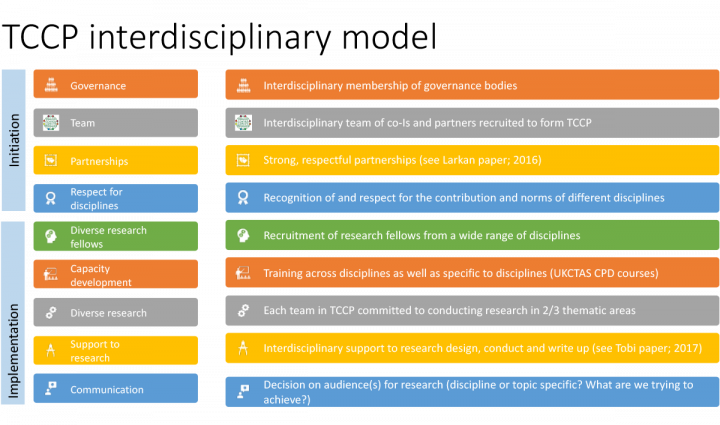Co-creation of Research
Focussing on supporting TCCP teams to develop policy relevant research in interdisciplinary working groups.
Inter-disciplinary working groups have been established to support the design and delivery of individual research projects. Initial drafts of research projects are prepared by the research fellow who will lead the work. This is then reviewed and refined within the working group. The working group continues to support the development of the research and outputs throughout the research project being conducted.
The image below illustrates the consortiums approach to interdisciplinary working:

Regular research calls on each of the main research themes have been convened by the programme since late 2019. This allows teams in different countries to provide updates on their progress, share lessons learned and identify potential areas of collaboration.
Research fellows highlighted the benefits of the TCCP interdisciplinary model for their work:
- S M Abdullah stated that “understanding and researching the nature of tobacco industry interference requires access to professors and other researchers from varied and different disciplines who can provide diverse perspectives and insights.” He also recognises that “building skills for research communications and influencing is vital and a real value addition for health economists who would not typically be exposed to such thinking.”
- Dr. Arti Singh appreciated “the support provided by the UK research fellows who are accessible, friendly and constructive.” Arti noted that the contributions from an air quality expert from the University of Stirling have been invaluable in shaping her research on smoke free legislation in Ghana. She realises that she “wouldn’t have been able to do what I wanted to do without him” and greatly appreciates the link that TCCP made to connect her to such novel ways of thinking.
- Dr. Gaurang Nazar appreciated “the interdisciplinary nature of the TCCP programme, finding it very different to other projects thanks to its engagement of experts with a wide variety of knowledge and expertise in taxation, non-communicable diseases (NCDs), policy and governance, etc. TCCP has enabled greater exposure to tobacco control research from other countries which has been a unique and rich experience.”

